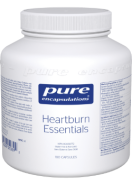DGL (deglycerhizinated licorce)
What Is DGL?
Licorice has a distinct and complex taste that may best be described as sweet and slightly bitter, with anise or fennel-like undertones. It is a unique flavour that some people love, while others find highly unpleasant. Licorice is derived from the root of the licorice plant (Glycyrrhiza glabra), which contains glycyrrhizin, a chemical compound responsible for its characteristic flavour. Read more >-
 Heartburn Essentials by Pure Encapsulations is a high-quality supplement that’s tested for potency, contaminants, heavy metals, solvents, allergens and doesn’t contain GMOs, pesticides or unnecessary bindings and coatings. Made in an FDA inspected facility to support digestion by decreasing indigestion and occasional heartburn. Heartbu...Heartburn Essentials by Pure Encapsulations is a high-quality supplement that’s tested for potency, contaminants, heavy metals, solvents, allergens and doesn’t contain GMOs, pesticides or unnecessary bindings and coatings. Made in an FDA inspected facility to support digestion by decreasing indigestion and occasional heartburn. Heartburn Essentials also provides maintenance for healthy gastric secretion under occasional stress. [VCAPS]+ Earn 69 Reward PointsOur Price: $69.25Out of Stock
Heartburn Essentials by Pure Encapsulations is a high-quality supplement that’s tested for potency, contaminants, heavy metals, solvents, allergens and doesn’t contain GMOs, pesticides or unnecessary bindings and coatings. Made in an FDA inspected facility to support digestion by decreasing indigestion and occasional heartburn. Heartbu...Heartburn Essentials by Pure Encapsulations is a high-quality supplement that’s tested for potency, contaminants, heavy metals, solvents, allergens and doesn’t contain GMOs, pesticides or unnecessary bindings and coatings. Made in an FDA inspected facility to support digestion by decreasing indigestion and occasional heartburn. Heartburn Essentials also provides maintenance for healthy gastric secretion under occasional stress. [VCAPS]+ Earn 69 Reward PointsOur Price: $69.25Out of Stock
DGL & Digestion
Licorice has a distinct and complex taste that may best be described as sweet and slightly bitter, with anise or fennel-like undertones. It is a unique flavour that some people love, while others find highly unpleasant. Licorice is derived from the root of the licorice plant (Glycyrrhiza glabra), which contains glycyrrhizin, a chemical compound responsible for its characteristic flavour. Glycyrrhizin has an intensely sweet taste, roughly 50 times sweeter than sugar, which is why licorice is so often used as a flavouring agent in food and beverages. Deglycyrrhizinated licorice (DGL) is most often used to treat digestive issues, including acid reflux, heartburn, and ulcers, as well as for sore throat and cough.
Licorice is also a staple of traditional medicine thanks to its unique therapeutic properties, including anti-inflammatory, antioxidant, and antiviral effects. Indeed, licorice has been used to treat various conditions, such as coughs, sore throats, and digestive issues. However, it's worth noting that the glycyrrhizin in licorice can have significant adverse side effects in high doses, including increasing blood pressure, lowering potassium levels, and causing electrolyte imbalance and fluid retention. This is why licorice extracts typically come deglycyrrhizinated – meaning with most of their glycyrrhizin removed.
Among other things, DGL increases mucus production in the stomach, which can help protect the mucosal lining and reduce inflammation.
Benefits of DGL
- Calms Symptoms Of IBS
- Protects The Intestinal Mucosa
- Relieves Acid Reflux
- Soothes Heartburn
- Treats Peptic Ulcers
Who Needs Deglycyrrhizinated Licorice?
Deglycyrrhizinated licorice has been used clinically for decades, primarily for treating gastrointestinal conditions, thanks to its powerful anti-inflammatory properties. Indeed, research has shown that licorice extract can inhibit several inflammatory enzymes, including cyclooxygenase-2 (COX-2) and 5-lipoxygenase (5-LOX), which reduces the production of pro-inflammatory compounds like prostaglandin E2, thromboxane B2, and leukotriene B4. In addition, licorice root extract has been shown to have potent antioxidant effects that can help heal digestive tract cells.
Back to Top ↑





















